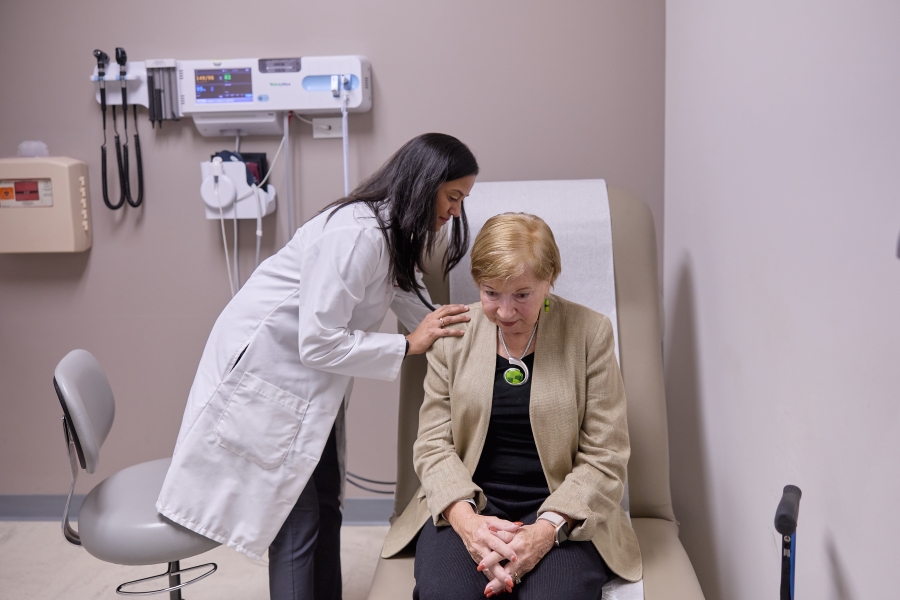We all feel tired from time to time. But when you have pulmonary hypertension, fatigue can be part of everyday life.
Pulmonary hypertension (PH) means that a person has high blood pressure in their lung arteries. This pressure disrupts the flow of blood through the heart and the lungs, forcing the heart to work harder.
The extra strain on the heart caused by PH can cause fatigue and make everyday activities feel harder. In fact, patients report that feeling tired is one of the most common symptoms of PH. Other symptoms include chest pain, heart palpitations, and shortness of breath. This can lead to a vicious cycle where individuals move less because they can’t handle it, and then end up feeling even more sluggish as a result.
As a heart failure cardiologist, I see the challenges that my patients face when living with PH-related fatigue. But I also like to tell my patients that there are things they can do to manage their energy levels. Here are four fatigue management strategies to focus on:
1. Take your medications as directed
The right medications may help you manage your PH and feel less fatigued.
For example, some medicines (called vasodilators) widen blood vessels, which improves blood flow so your heart doesn’t have to work as hard. Your doctor can tell you what medicines may help you, depending on the type of PH you have and your overall health.
It’s important to take medicines as directed. If that’s a challenge for you, let your doctor know. Never stop or make changes to your medications without talking to your doctor.
2. Find safe physical activities
It might seem surprising, but physical activity can actually help people with PH boost their energy levels. Exercise improves your heart and lung health, which gives you more energy for everyday activities — like climbing stairs or going food shopping. And it can also lift your mood. Starting with just a few minutes a day and slowly adding more can ease you into this new habit and make a huge difference.
If you have PH, it’s important to choose activities that are safe for you. Always talk with your doctor before starting an exercise program. They can offer advice based on your individual needs.
Depending on my patient’s condition and interests, I often recommend exercises that support heart and lung health, such as:
- Walking. Start with a stroll around the block. Over time, you can work up to walking for 30 minutes or longer.
- Swimming. Try water aerobics or swim laps at your own pace.
- Cycling. Recumbent bikes are low-impact and stationary, so there’s no risk of falling.
- Yoga. Slow, mindful stretching can be a great stress reliever. It can also reduce inflammation.
- Light resistance training. Lifting light weights (as light as a can of soup) or doing body weight exercises (like calf raises or wall push-ups) can make your muscles stronger.
3. Ask about cardiac rehabilitation
Cardiac rehab can teach you ways to better manage your PH symptoms, which can increase your energy level. I encourage my PH patients to give it a try.
Cardiac rehab programs, like those at Temple, are personalized to each patient's needs. For instance, you might:
- Develop techniques to conserve energy throughout the day
- Learn what exertion level is safe for you — and when to stop or slow down
- Work on exercises that can help you feel less out of breath
4. Balance daily activities
Small tasks can add up over the course of the day, so try to think about the little ways you can lighten your load. Many of my patients conserve their energy with these strategies:
- Move slowly and steadily instead of rushing.
- Put frequently used items (like your phone) in spots that are easy to grab.
- Move things around the house in a cart with wheels.
- Sit down when you're cooking, eating, getting dressed, and bathing.
- Wrap yourself in a towel instead of drying off.
- Use lightweight cooking tools.
- Use tools that make chores easier, like the dishwasher or an electric can opener.
Get help for your PH
The experts with the Pulmonary Hypertension, Right Heart Failure, and CTEPH/PTE Program are here to help you feel your best. They offer comprehensive care and leading-edge treatments to help you live your best with PH. To get started, call 800-TEMPLE-MED (800-836-7536) or request an appointment online.
Helpful Resources
Looking for more information?
